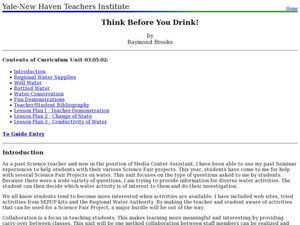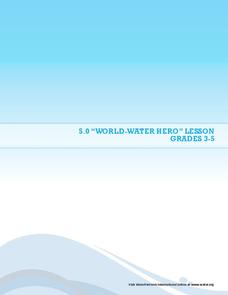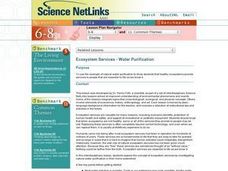Curated OER
'Round and 'Round it Goes!
Students discuss and interpret background knowledge on poster copy given on the water cycle. Students complete the included activity sheets using the poster as a reference in small groups. Students identify and name where water can be...
Curated OER
Ecology
Students make connections between their daily lives and the usage of natural resources as they relate to the importance of environmental quality. In this ecology lesson, students listen to the story The Lorax by Dr. Seuss...
Curated OER
Stream Ecology In Wisconsin and Puerto Rico
Students identify the different types of water and explain in what proportions they exist on Earth. They identify and correctly label the parts of the water cycle and how these parts interact with each other. Students identify the...
Curated OER
THE INCREDIBLE JOURNEY
Students describe the movement of water within the water cycle and identify the states of water as it moves through the water cycle.
Curated OER
Discovering National Parks
Students work to preserve American National Parks. In this environmental activism lesson, students research the history of the national parks and determine why they were created. Students then focus on protecting the land, using it for...
Curated OER
Pollution is Not a Solution
Students explore the environment by completing science worksheets in class. For this water conservation lesson, students identify ways water is used in our society and how we abuse the privilege. Students discuss methods to reduce water...
Curated OER
Think Before You Drink
Students explore the different water issues facing society today. In this environmental science lesson, students research about water treatment methods. They brainstorm ways to conserve water.
Curated OER
Living Organisms as Indicators of Pollutants in Fresh Water Ecosystems
Students observe the effects of pollution on living organisms. In this pollution lesson plan, students observe fresh water Hydra and look at their structures and movement. They place samples of pond and lake water on the Hydra and...
Curated OER
Freddy the Fish
Students complete an experiment. In this water pollution lesson, students brainstorm information about river habitats and water pollution. Students then read the story Freddy the Fish and complete an experiment where they use a...
Curated OER
Now You Have It, Now You Don't
Sixth graders compare corn-based shipping peanuts to Styrofoam shipping peanuts. In this hands-on environmental awareness lesson, 6th graders try dissolving two different types of packing peanuts in water.
Curated OER
Molehill or Mountain
Learners explore the concept of waste management. In this environmental stewardship lesson, students consider the trash generated by people per day and discuss what steps they can personally take to reduce waste.
Curated OER
Clarity and Turbidity
Learners discuss water clarity and how the environment can affect it. They perform experiments to check the readings of the water depth and measure water clarity. Students discuss vocabulary words, record their observations and examine...
Curated OER
What Have We Done?
Learners investigate the effect of dams on the ecosystem. In this environmental lesson, students read case studies on the Aswan Dam and the Colorado River Basin and construct a T-chart to compare the effects on the region.
Curated OER
Biosphere II
Students continue their examination of the existence of life on Earth. In groups, they determine the role of the water cycle and other biogeochemical cycles play in keeping balance on Earth. They participate in experiments to discover...
Curated OER
Images as Messages
Your class watches a video about Chris Jordan, a talented photographer and activist who tries to get an environmental message out by his work. As a cross-curricular project, have your class imitate his style of art with an object that...
Curated OER
Particulate Matter
Seventh graders examine the different types of pollutants. In this environmental science lesson, 7th graders observe particulate matter under a microscope. They explain how these can affect once health when breathed in large quantities...
Curated OER
Surviving the Conditions
Students explore Earth science by participating in an environmental care activity. In this natural resources lesson, students discuss ways to protect themselves from the environment if they are ever in need of shelter in the wilderness....
Curated OER
Celebrating Earth Day
Students explore environmental safety by planting seeds outside their classroom. In this Earth Day lesson, students identify the different ways to recycle and conserve resources on Earth while facilitating recycling bins around campus....
Curated OER
Avalanche
Middle schoolers investigate natural disasters by participating in an experiment. In this water formation activity, students define the dangers associated with avalanches and landslides. Middle schoolers utilize a bag of sand,...
Curated OER
Water-our Precious Resource
Students complete a unit of lessons on water as a limited resource. They conduct Internet research, record information in electronic journals, utilize spreadsheets, conserve water and record the results, and conduct water safety tests on...
Curated OER
World-Water Hero
Students explore why clean water is essential. In this environmental activity, students identify the "powers" we need to improve the quality of water. Students share their descriptions of world-water superheroes.
Curated OER
Water Cycle
Third graders explore the water cycle and place pictures of the water cycle in sequential order. They investigate a problem and determine if it is reasonable or not to believe that there is water in air to cause a puddle. ...
Curated OER
Water-Is There Going to be Enough?
Students research the availability, usage and demand for water in the local area historically and use projections of the availability, usage and demand for water up to the year 2050. They gather data and present the information in...
Curated OER
Ecosytems: Water Purification
Learners explore how ecosystems purify water and what kinds of things humans do that alter these processes. They use a website to access information on local watersheds and develop a "river" newspaper























